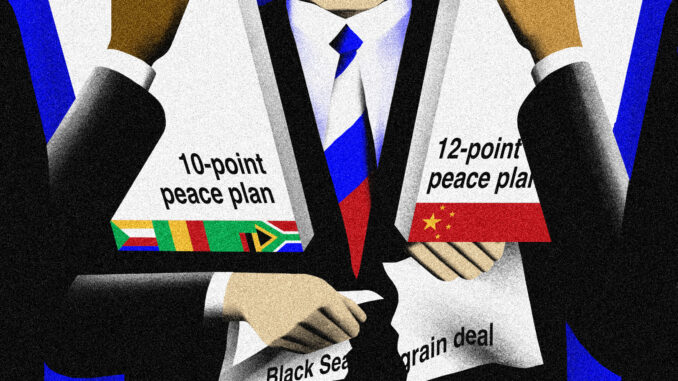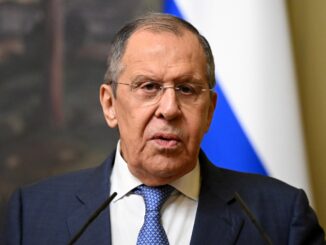
As African leaders walk into a giant St Petersburg arena on July 27 to shake hands with Russian President Vladimir Putin, the banners and hoardings around them will celebrate historic ties between their continent and Moscow.
Yet, behind public bonhomie, the second Russia-Africa summit – the first one was held in 2019 – will be shadowed by the tension of the war in Ukraine, now in its 18th month.
In June, the presidents of South Africa, Senegal, Comoros and Zambia visited St Petersburg to meet Russian President Vladimir Putin with a 10-point peace plan aimed at convincing Ukraine and Russia to start negotiations. Senegal leader Macky Sall later said that they asked Putin to “show his desire to move forward [with peace]” before the St Petersburg summit.
Instead, a month later, Putin appears to have done the opposite – pulling out of the Black Sea grain deal that allowed the sea export of Ukrainian wheat and maize, on which many African nations depend.
Meanwhile, about 6,000km (3,728 miles) to the southeast of St Petersburg, in Beijing, China too has talked up a 12-point peace plan that it says could help end the war.
But as with the African leaders, China’s moves so far have neither edged Putin away from brutal attacks on Ukraine nor convinced Kyiv that it is time to settle for peace.
When they were first unveiled, the African and Chinese peace plans drew global attention at a time when the international appetite for a peaceful resolution to the conflict has grown amid high energy prices, food shortages and runaway inflation.
With the West firmly backing Ukraine, the opportunity for countries and alliances from the Global South to emerge as potential peace brokers has flourished, potentially flipping the script on what has been a United States-led international order.
But can Africa or China really help end the war? How much do they want to end the conflict? And are Russia and Ukraine even seriously interested in engaging with them to work towards a peace solution?
The short answer: There will likely be no peace negotiations anytime soon. Neither Ukraine nor Russia is prepared to cede territory, and there seems to be little, if any, common ground for dialogue to begin. As a result, the Chinese and African initiatives at the moment appear ineffective. However, eventually, real discussions will need to take place, say analysts. And when the sides are ready to negotiate, China’s influence over Russia and Africa’s relative neutrality could make them well-placed to mediate between Kyiv and Moscow.
Russian President Vladimir Putin, left, listens to South African President Cyril Ramaphosa during their talks after a meeting between a delegation of African leaders and Putin in St Petersburg, Russia, on Saturday, June 17, 2023, on an African proposal to end the war in Ukraine [Ramil Sitdikov/Photo host Agency RIA Novosti via AP]
‘Difficult to realise’ African plan
Air sirens screeched out loud, sending the peace delegations of South Africa, Senegal, Comoros and Zambia scurrying into a bomb shelter.
Led by the presidents of the four nations, the African team was in Kyiv in June to speak to Ukrainian President Volodymyr Zelenskyy about their plan to bring peace to his country by ending Russian aggression. The missiles that struck the Ukrainian capital while they were visiting served as the backdrop for those talks.
Beyond some broad proposals – like the need for both sides to listen to each other respectfully – the 10-point peace plan also lays out some specific points. These include that both countries recognise the sovereignty of states as enshrined in the United Nations Charter and that steps must be taken by both sides to release prisoners of war.
The plan also clearly states that supply chains in the Black Sea be opened for trade, a point made all the more prescient by Russia’s bombardment of the Ukrainian ports of Odesa and Chornomorsk, from where Ukraine exported grain.
In a press conference with the visiting leaders – South African President Cyril Ramaphosa, Senegalese President Macky Sall, Zambian President Hakainde Hichilema and Comoros President Azali Assoumani – the Ukrainian leader indirectly dismissed their peace proposal. Zelenskyy insisted that Kyiv would only join any peace after a complete Russian withdrawal from Ukrainian territory.
From Kyiv, the African leaders flew to St Petersburg to meet Putin.
“This war has to have an end … It must be settled through negotiations and through diplomatic means,” Ramaphosa said.
Putin praised the African presidents for their “balanced approach” but interrupted them when they were speaking to suggest that their proposals were misguided.
He appeared to object, in particular, to the notion that Russia had been responsible for a rise in global food prices in 2022, telling the delegation that Ukrainian grain exports from Black Sea ports permitted since the grain deal began had largely gone to wealthy countries.
Kremlin spokesman Dmitry Peskov was quoted by Russian news agencies after the Moscow meeting as saying that the African plan would be “difficult to realise”.
Could that rejection from Russia and Ukraine change?
For that to happen, African nations need to look beyond the peace proposal they are offering, according to Gustavo de Carvalho, a senior researcher on Russia-Africa ties at the Johannesburg-based South African Institute of International Affairs.
They need to look first at how they are viewed in Ukraine in particular, he said.
From left: Egypt’s Prime Minister Mostafa Madbouly, Senegal’s President Macky Sall, President of the Union of Comoros Azali Assoumani, Ukrainian President Volodymyr Zelenskyy, South African President Cyril Ramaphosa and Zambia’s President Hakainde Hichilema walk during their meeting in Kyiv, Ukraine, on Friday, June 16, 2023 [Ukrainian Presidential Press Office via AP]
Africa’s perception problem – and advantage
Since Russia’s full-fledged invasion of Ukraine in February 2022, many African nations have repeatedly abstained from condemning Moscow in UN resolutions against the war.
African nations will need to get rid of the perception held by many in Ukraine that they are fundamentally “pro-Russia”, de Carvalho said, before Kyiv would seriously consider their peace plan.
Quietly, they’ve already been shifting their postures, he said. Now, de Carvalho said, it’s important for Ukraine, too, to adapt its views of Africa to acknowledge that change.
For instance, in calling for the sovereignty of states in accordance with the UN Charter, the African peace plan actually “shifted the needle” in how a country like South Africa framed the war and looked to include the Ukrainian perspective, de Carvalho told Al Jazeera. South Africa’s traditional ties to Russia are rooted in Moscow’s support for its historical struggle against apartheid.
“I think if we assess those 10 points, the majority of them are actually fairly pro-Ukraine,” he said.
Ramaphosa has also put his foot down over Putin’s participation in the Brazil-Russia-India-China-South Africa summit that Johannesburg is hosting in August.
The International Criminal Court (ICC) has issued an arrest warrant for Putin related to the Ukraine war and South Africa, as a signatory to the Rome Statute of the ICC, would have been obligated to arrest the Russian leader were he to attend. In the past, South Africa has ignored that responsibility – such as when it hosted then-Sudan leader Omar al-Bashir in 2015, despite an ICC warrant against him.
This time, however, Ramaphosa insisted and managed to convince Putin to stay away: Russian Foreign Minister Sergei Lavrov will represent Moscow at the summit instead.
Moreover, ideological positions would eventually give way to pragmatism, de Carvalho explained, as significant economic implications of a protracted conflict deepen the crises faced by many African nations.
The war has caused a sharp rise in global food prices, which has disproportionately affected the African continent. Before the war, African nations imported more than half of all of their wheat from Russia or Ukraine. In the first year of the war, Africa suffered a shortage of 30 million tonnes of wheat. With the Black Sea grain deal collapsing, that food crisis could get even more severe.
Yet, for all the reasons why Africa might want an early end to the war, can the continent play an actual role in a peace process?
African nations clearly have a “limited impact” on the dynamics of geopolitics, de Carvalho said. But this fact could also bring them credibility in a mediation process.
“I don’t think anyone is really expecting that a peace agreement is going to happen anytime soon,” he said. In the long term, he said, the responsibility would likely fall “to a party that is not considered to be too involved in the conflict; and that leaves pretty much the Global South to actually engage with those initiatives”.
Russian Foreign Minister Sergei Lavrov, second left, and Li Hui, China’s special envoy for Eurasian affairs, second right, speak during their meeting in Moscow, Russia, on Friday, May 26, 2023 (Russian Foreign Ministry Press Service via AP)
Mandarin mediator?
If distance from the conflict is the trump card that African nations could bring to negotiations, China offers a different promise to those seeking to get Russia to end the war.
It is the single largest benefactor of its northern neighbour, holding up its economy through a sharp increase in oil purchases and other trade and giving Moscow political cover at international platforms like the UN Security Council.
After months of persuasion from European nations to use that influence to lean on Putin to withdraw his troops from Ukraine, China unveiled a peace plan in March.
That came on the back of a dramatic breakthrough in ties between Saudi Arabia and Iran, mediated by – and in – China, underscoring Beijing’s mounting appetite for a leading role in global conflict resolution. China has also offered to mediate between Israel – a major trade partner of Beijing’s – and Palestine, even hosting Palestinian President Mahmoud Abbas in June.
But unlike these efforts, its peace plan for the Ukraine war is broad, vague and open to interpretation, calling for Russia and Ukraine to abandon their “cold war mentality”, cease hostilities and resume peace talks. Sensible points perhaps, but hardly convincing arguments for two countries locked in the middle of a devastating war to lay down their arms.
That’s not surprising, according to some analysts.
The other peace initiatives that Beijing has promoted have largely been in longstanding conflicts where peace allows China to protect its own interests, according to Niva Yau, a nonresident fellow with the Atlantic Council’s Global China Hub. Saudi Arabia and Iran, for instance, are both key partners for China and better relations between them reduce the risks to Chinese investments in either of those nations.
However, in the war in Ukraine, Yau said, China currently stands to gain not from peace, but from “prolonged war” that drains the West’s resources and helps ramp up lucrative bilateral trade with a vulnerable and isolated Russia.
There is a lot of “wishful thinking” in the Global South, in particular, that China is stepping up and playing a mediator role in good faith, said Yau.
It represents an understandable desire for an alternative to the global order that the US helped create and which many countries in the Global South harbour real grievances towards. But China, she said, is not the answer in this case.
A long war, she argued, helps China “distract the world” and “normalise neutrality in the face of conflict”. This, she said, would ultimately enable any military adventures China might want to embark on in the future, including a possible move on Taiwan, which Beijing views as Chinese territory.
Still, it is not in China’s interests to see Russia weakened beyond a certain point. And if military, economic and geopolitical setbacks begin to pile up for Russia and push it to the edge of a collapse, the rest of the world knows that only one country can convince Putin to settle for a deal before it’s too late: China.
Ukrainian Foreign Minister Dmytro Kuleba speaks on the situation in Ukraine, Monday, July 17, 2023, at a United Nations Security Council meeting [Mary Altaffer/AP Photo]
What does Ukraine think?
As with Africa, Ukraine does not view China as neutral to the conflict.
It has remained diplomatic and retained channels of communication with both China and the African leaders since their delegations visited Kyiv, but has effectively rejected their peace roadmaps for now.
Ukraine’s Foreign Minister Dmytro Kuleba met with Li Hui, China’s special representative for Eurasian affairs and former ambassador to Russia, in May and emphasised that Ukraine does not accept any proposals that would involve the loss of its territories or the freezing of the conflict.
Kyiv has also been dismissive of other suggestions from the Global South, including Brazilian President Luiz In?cio Lula da Silva’s suggestion of a ‘peace club’ including India, Indonesia, China and other Latin American countries as potential members.
Ukraine also has its own peace plan, which it has pushed at high-level international meetings, including that with both the African and Chinese parties, and which insists on a full recapture of territories occupied by Russia at the moment.
Buoyed by Zelenskyy’s rockstar reception at the G7 summit in Hiroshima in May, Ukraine’s Deputy Head of the Office of the President of Ukraine Ihor Zhovkva told a Reuters reporter afterwards that “there cannot be a Brazilian peace plan, a Chinese peace plan, a South African peace plan when you are talking about the war in Ukraine”.
Ukrainian demands for any peace settlements do not just focus on territory but also on bringing Putin and others in the Russian leadership to justice for the illegal invasion and alleged war crimes. That is something that African nations and China are not likely to agree to.
Oleksandra Matviichuk of Ukraine’s Center for Civil Liberties and a recent recipient of the Nobel Peace Prize, told Al Jazeera: “Sustainable peace is the freedom to live without fear and to have a long-term perspective.” That, she said, is not possible for Ukraine unless Russian leaders and military officers suffer consequences for their actions.
The “circle of impunity” that allows Moscow “to achieve their geopolitical goals” through war crimes must be ended with an “international tribunal to hold Russian war criminals accountable”, Matviichuk said.
Demonstrators protest against the war in Ukraine in Cape Town, South Africa, Thursday, June 1, 2023. Russian President Vladimir Putin will stay away from South Africa, which he was supposed to visit for a BRICS summit in August, as he is under indictment by the International Criminal Court [Nardus Engelbrecht/AP Photo]
Kremlin cracks?
While it is unclear how far Matviihuk’s hope will be realised, there are growing signs of the Kremlin’s weakened ability to influence Russia’s relations with Africa and China according to Moscow’s worldview.
If South Africa asking Putin to stay away from its country was one indicator, a recent comment by a senior Chinese official was another.
Asked if Beijing would back a return to Ukraine’s 1991 borders – after the breakup of the Soviet Union and before Russia’s invasions into Ukraine – Fu Cong, China’s ambassador to the European Union said: “Why not?”
Meanwhile, Russia has largely welcomed China’s peace plan, which Putin has said “correlates to the point of view of the Russian Federation”.
In May, during Eurasian affairs envoy Li’s trip to the Russian capital, Lavrov praised Beijing’s “balanced position” on the war and its readiness to play a “positive role” in its settlement.
Russia remained lukewarm, however, to the African proposal. Lavrov said Moscow shared the “main approaches” of the plan, though Putin appeared impatient in his meeting with African leaders.
At the St Petersburg summit, he’ll come face to face with many of the continent’s heads of state again. Days after Putin pulled out from the grain export deal, he might find that it’s Africa whose patience with Russia is starting to run out.
Not right away. But if the mood for talks grows, Africa and China hold advantages that could make them vital mediators.
ENB Top News
ENB
Energy Dashboard
ENB Podcast
ENB Substack



